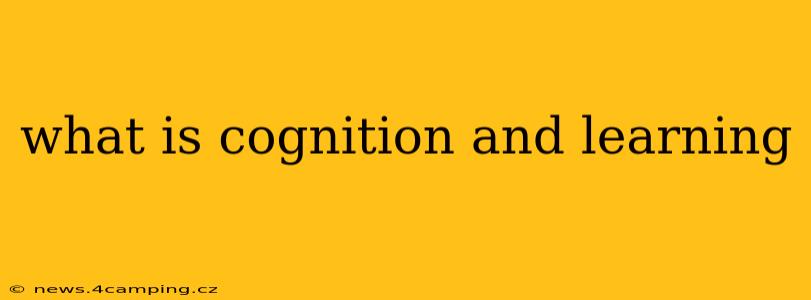Cognition and learning are deeply intertwined processes that shape our understanding of the world and our ability to interact with it effectively. While distinct, they are inextricably linked, with cognition providing the framework for learning, and learning constantly refining and expanding our cognitive abilities.
What is Cognition?
Cognition refers to all the mental processes associated with acquiring, processing, storing, and using information. This encompasses a vast range of activities, including:
- Perception: How we interpret sensory information from the environment.
- Attention: Focusing on specific stimuli while filtering out others.
- Memory: Encoding, storing, and retrieving information. This includes sensory memory, short-term memory, and long-term memory.
- Language: Understanding and using language to communicate.
- Problem-solving: Identifying and finding solutions to challenges.
- Decision-making: Evaluating options and choosing a course of action.
- Reasoning: Drawing logical conclusions from available information.
- Imagination and Creativity: Generating new ideas and concepts.
Cognition is not a single, unified process but rather a complex interplay of various cognitive functions working together. It's the underlying machinery of our mental lives, allowing us to navigate the world, solve problems, and engage in meaningful interactions.
What is Learning?
Learning is the process of acquiring new knowledge, skills, behaviors, values, or preferences. It involves changes in our internal state, leading to relatively permanent alterations in our behavior or potential behavior. Learning can occur through various mechanisms:
- Classical Conditioning: Associating two stimuli, resulting in a learned response. (e.g., Pavlov's dogs)
- Operant Conditioning: Learning through reinforcement and punishment.
- Observational Learning: Learning by watching others.
- Cognitive Learning: Learning through mental processes such as problem-solving, memory, and insight.
Learning is a dynamic process; it's not just about passively absorbing information but actively engaging with it, making connections, and building upon existing knowledge. The effectiveness of learning is influenced by factors like motivation, prior knowledge, and the learning environment.
How are Cognition and Learning Related?
Cognition and learning are intrinsically linked. Our cognitive abilities underpin our capacity for learning. For example, our attention span directly impacts how much information we can absorb. A strong memory allows us to retain and retrieve learned information effectively. Our problem-solving skills are crucial for adapting new knowledge to different situations. Conversely, learning enhances our cognitive abilities. As we learn, our brains develop new neural pathways, strengthening existing cognitive functions and potentially creating new ones. The more we learn, the more sophisticated our cognitive processes become.
How Does Cognition Affect Learning?
Working Memory Capacity and Learning: A limited working memory capacity can restrict the amount of information processed simultaneously, hindering learning, especially in complex tasks.
Attention and Learning: Sustained attention is vital for encoding and consolidating new information. Distractions severely impair learning outcomes.
Prior Knowledge and Learning: Existing cognitive structures (schemas) influence how we interpret and integrate new information. Prior knowledge acts as a scaffold for new learning.
How Does Learning Affect Cognition?
Neuroplasticity and Learning: Learning stimulates the brain's plasticity, creating new neural connections and strengthening existing ones, enhancing cognitive functions.
Cognitive Development and Learning: Learning across the lifespan shapes cognitive development, improving our ability to reason, solve problems, and make decisions.
Metacognition and Learning: Learning to monitor and regulate one's own thinking processes (metacognition) improves learning efficiency and effectiveness.
In conclusion, cognition and learning are intertwined processes that shape our mental abilities and determine how we interact with the world. Understanding this relationship is crucial for optimizing learning strategies and enhancing cognitive performance throughout our lives.
